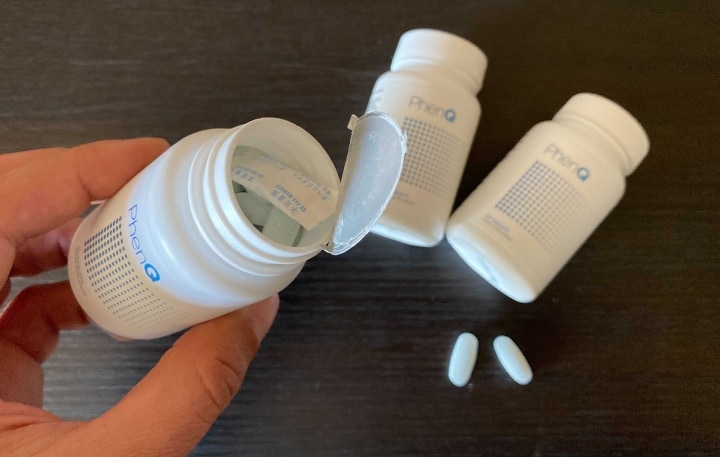Does PhenQ Make You Poop? (see why)
Max Health Living is a reader-supported site. Purchases made through links may earn a commission. Learn more.
While scientists do hypothesize that obesity may raise the likelihood of constipation, experts are yet to form a conclusive consensus on the existing studies.
Still, a recent examination of patient records at a pediatric gastroenterology clinic indicated that overweight children are more likely to experience constipation.
Nonetheless, maintaining regular bowel movements is essential for good gut health and weight management. With that in mind, here is a quick overview of how PhenQ may help in this regard.
Key Points:
- PhenQ may help to ease your bowel movements.
- The ingredients – caffeine, L-carnitine, and nopal fiber contribute to the benefits in this regard.
- You are more likely to get self-limiting diarrhea from PhenQ than from constipation.
- Find more about this on PhenQ’s official website for the BEST price.
PhenQ contains several ingredients that may affect bowel movements, including nopal fiber, caffeine, and L-carnitine. While on the one hand, the nopal fiber adds bulk to the stool. On the other, caffeine and L-carnitine improve gut motility.
So, keep reading to learn more about the possible laxative effects of PhenQ.
Why Does PhenQ Make You Poop?
The PhenQ ingredients that may help regulate bowel movements and improve gut motility are nopal fiber, caffeine, and L-carnitine.
But only statements are not enough, which is why in this section, I will include the scientific evidence that supports PhenQ’s potential to make you poop more easily.
Nopal Helps To Normalize The Bowel Movements
Nopal acts as a natural laxative and increases the weight and size of your stool, which prompts easy bowel movements.
Moreover, it acts as a prebiotic and nourishes the gut microbiome, which overturns any dysbiosis and helps to normalize defecation frequency.
A balanced gut microbial diversity is important because emerging studies suggest that a higher methane-producing bacteria slows down the intestinal transit time.
For instance, researchers found that chronic constipation patients had a 16% higher abundance of methanogens compared to healthy controls.
In another study, the abundance of methane-producing bacteria was recorded as 75% in slow-transit constipated patients, 44% in normal-transit constipated patients, and 28% in controls.
And this is where the nopal comes in; a murine study showed that the nopal increased the diversity and metabolic activity of the gut microbiome, which alleviated constipation.
This was achieved through the fermentation of nopal fiber by gut bacteria, which produces short-chain fatty acids (SCFAs) as a byproduct.
These SCFAs create a favorable gut environment for the growth of probiotic microorganisms and also act as laxatives.
Caffeine Propagates Colon Contractions, Which Will Make You Poop Easy
Additionally, research suggests that caffeine increases the contractions in the colon muscles, which pushes stool toward the rectum (aka colonic motor activity).
This study compared the bowel movements induced by a 1000 kcal meal, water, decaffeinated coffee, and caffeinated coffee.
The results showed that the colonic contraction due to caffeinated coffee was 60% and 23% greater than those of water and decaffeinated coffee, respectively, but similar to that of a meal.
If these were the results with only one cup (240 ml) of caffeinated coffee, which contains approximately 95 mg of caffeine according to the USDA, then imagine how strong of an effect the 142.5 mg of caffeine per serving in PhenQ might exert.
L-carnitine Is Essential For Relieving And Preventing Gut Dysmotility
Carnitine deficiency is associated with impaired motility of the gut smooth muscles, which is similar to what occurs to the skeletal muscles in the extremities in this case.
Hence, its supplementation may help improve gut motility and make it easier to poop.
Therefore, multiple studies were performed on constipation patients that had a carnitine deficiency due to some diseases.
For instance, in 2016, Japanese researchers administered L-carnitine for three months to fifteen hemodialysis patients who had developed constipation due to restriction of water intake.
As a result, they not only reported increased stool frequency, but it also improved their muscle discomfort and their gut microbiome composition.
To offer further explanation, when L-carnitine helped to regulate bowel movements, it led to an altered intestinal environment that consequently caused a decrease in the clostridium species (bad bacteria).
In another study, scientists recruited constipated individuals with motor and intellectual disabilities, which are also more likely to have carnitine deficiency, and supplemented them with L-carnitine.
The result? The L-carnitine helped to lower the severity of constipation significantly.
Can PhenQ Cause Diarrhea?
Yes, the caffeine, L-carnitine, chromium, and capsimax powder in PhenQ may cause or worsen diarrhea.
As you may already have the idea by now, L-carnitine helps to soften the stool and increase defecation frequency, so diarrhea is one of its side effects.
Similarly, loose stools are also a side effect of chromium supplementation.
Additionally, caffeine may also increase stool frequency in some people who are sensitive to it.
Lastly, If you have underlying gut issues, the capsaicin in capsimax powder may irritate your stomach lining.
As a result, your gut may try to excrete it rapidly, which can lead to diarrhea.
However, it would be best if you did not worry about this side effect because, in most cases, it will eventually resolve on its own when your gut gets used to the PhenQ ingredients.
Does PhenQ Cause Gas And Bloating?
Yes, the study that I mentioned earlier, in which scientists compared the colonic motor activity induced by food and drink, also stated that coffee induces 50% more colonic contractions than water.
This explains why some of you might get gassy, urinate frequently, and get abdominal cramps from its consumption and why there might be a similar case occurring with PhenQ.
Similarly, if you are not used to eating fiber, then the nopal fiber may also initially cause problems until your gut adjusts to it.
The reason is that nopal fiber is an indigestible carbohydrate, and when indigestible food sits in your colon, it is broken down by the bacterial inhabitants there, which releases gas, and hence you feel gassy and bloated when taking PhenQ.
Nonetheless, this is a temporary side effect of PhenQ and may resolve in a few days after your gut adjusts to the fiber intake and your body gets used to the caffeine.
However, another way to prevent these side effects is to increase your water intake.

Does PhenQ Make You Constipated?
No, users don’t usually report constipation with PhenQ. So there may be other factors contributing to it if you get this side effect. The reason is clear because I have already elaborated on how most PhenQ ingredients facilitate the elimination of feces.
Regular bowel movements also enhance your fat excretion, so it is uncommon for diet pills to cause constipation.
What Happens When You Stop Taking PhenQ?
When you stop taking PhenQ, your bowel habits may revert to their original state.
Hence, if you had been suffering from constipation before taking PhenQ, then it may also return after you discontinue its use.
The reason is that the nopal fiber, caffeine, and L-carnitine in PhenQ only temporarily aid your gut motility and don’t leave any permanent effects.
FAQs
How does PhenQ work?
PhenQ works by inducing weight loss in five ways. It promotes fat burning, prevents re-accumulation of fat, improves mood, boosts energy levels, and suppresses appetite.
Does PhenQ make you jittery?
Yes, PhenQ may make you jittery if you are caffeine sensitive because it contains 142.5 mg of caffeine per serving.
What to eat when taking PhenQ?
It would be best if you preferably ate a low-sugar calorie-restricted diet that fills you with essential macro and micronutrients.
Additionally, it is better to eat meals containing complex carbohydrates, good fats (omega 3 and 6), and lean protein. Read more about foods to eat with PhenQ here.
How much weight can I lose with PhenQ?
PhenQ can help you lose over five pounds in a month. If you want to know more about the weight loss progress you can achieve it in different durations with PhenQ from actual user reviews.
How long does it take to see results with PhenQ?
You may start feeling a difference within a minimum of two weeks but keep taking it for at least a month to witness a significant improvement. If you think that PhenQ is not working for you, here is an article that I have compiled about it, which can help you identify the underlying reason.
What does PhenQ look like?
PhenQ is a white-colored tablet, and it comes in a blue-capped bottle. Find out more about it on its official website.
Does PhenQ make you go to the bathroom?
Yes, PhenQ may help to regulate your bowel movements. You may also initially get diarrhea for that reason.
Important Disclaimer: The information contained on MAX HEALTH LIVING is intended for informational and educational purposes only. Any statements made on this website have not been evaluated by the FDA and any information or products discussed are not intended to diagnose, cure, treat, or prevent any disease or illness. Please consult a healthcare practitioner before making changes to your diet or taking supplements that may interfere with medications.
Who We Are

We are a team of fitness, health, and supplement experts, and content creators. Over the past 4 years, we have spent over 123,000 hours researching food supplements, meal shakes, weight loss, and healthy living. Our aim is to educate people about their effects, benefits, and how to achieve a maximum healthy lifestyle. Read more.




